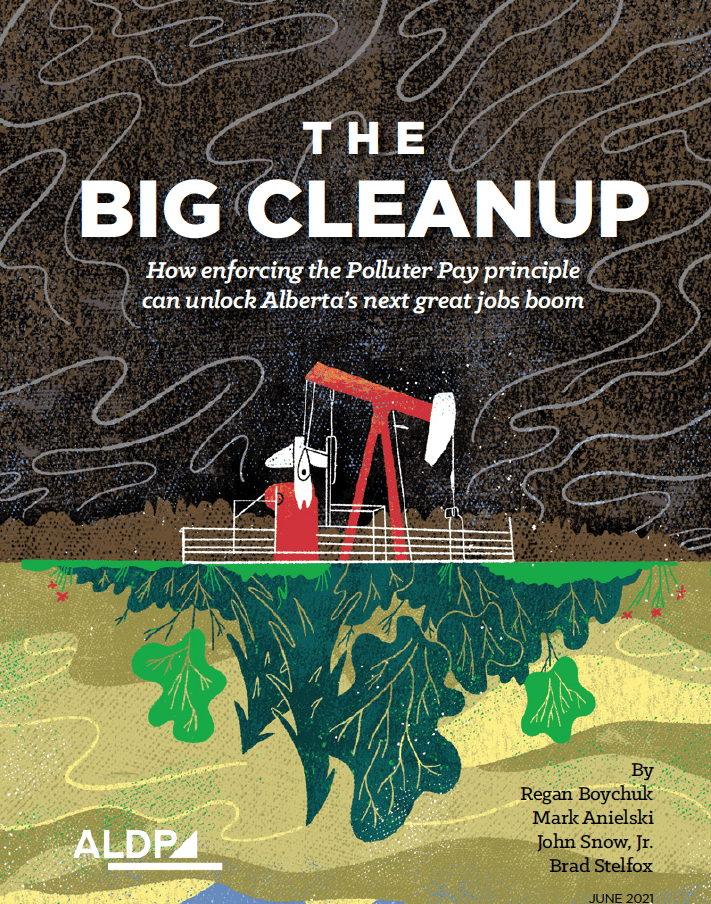Alberta claims to have an ethical oil industry. An ethical industry would pay its way and clean up its own mess. This is called the Polluter Pay principle and it’s fundamental to Canadian environmental law. Unfortunately, that’s not what’s happening in Alberta.

The Alberta Liabilities Disclosure Project's new report, The Big Cleanup, shows that, over and over, the polluter doesn’t pay, and gets away with it. Instead, decades of unwise regulation and weak enforcement have allowed Alberta’s oil industry to pocket huge profits while sticking the public with the bill.
We’re talking about a really huge bill, billions of dollars. Make no mistake, every Canadian taxpayer is paying for the Alberta oil industry mess. The federal government is pumping taxpayers’ money into the bank accounts of the richest industry in the world. These subsidies are in flagrant disregard of Polluter Pay, and of Canada’s promises to stop subsidizing fossil fuels.
It doesn’t have to be this way.
Polluter Pay isn’t complicated. Every kindergarten child knows, if you make a mess, it’s your job to clean it up.
The 13 recommendations in this report are all common sense: be honest about the true cost of cleanup, ensure polluters fund the cleanup, and make sure the cleanup gets done on time.
I’ll speak to two of them.
Collecting cleanup costs in advanceFirst, the regulator needs to collect cleanup costs before companies become insolvent (#5). Right now, the Alberta Energy Regulator doesn’t require cleanup deposits upfront before drilling an oil or gas well. It only tries to collect a cleanup deposit from a company after it becomes insolvent.
That is way too late.
Any modern regulator would know that Alberta’s system will not work. When exploiting a resource creates money for companies at the beginning and leaves a mess at the end, the regulator’s job is to make sure the polluter pays and cleans up its mess. That means accurate cleanup estimates and strict cleanup timelines, backed up with enough cash to get the cleanup done. In other words, the government has to make sure enough cleanup money is put aside all along, before “profits” are paid out. This is called financial security.
Canada has lots of experience with resource companies going bankrupt and leaving huge debts and messes behind. When the government doesn’t hold enough financial security, the public regularly gets stuck with a big bill, pollution, and sometimes threats to public health.
For every new well—and for the 20% of Alberta wells that aren’t insolvent yet—financial security should be collected throughout its productive life—it’s just common sense. S. 135 of the Alberta Environmental Protection and Enhancement Act says the government can collect financial security.
Make all the polluters paySecond, governments should use lookback powers to make previous operators cleanup abandoned wells. This is Recommendation #10 in the report.
Alberta has routinely allowed big companies to offload billions in aging wells to small players who become inactive or go bankrupt without cleaning them up. No one should be surprised that this creates a conveyor belt of liability dumping that the oil industry is quick to exploit.
Under S. 140 of the Alberta Environmental Protection and Enhancement Act, the government can order any “operator” to reclaim a well that has not yet been safely closed. Under s. 134, this includes.
(i) an approval or registration holder who carries on or has carried on an activity ...,
Ontario uses similar provisions to order past operators to clean up contaminated sites. If the Alberta law doesn’t allow the same thing, it can easily be changed.
The premise is simple: if you profited from creating the mess, you have a role in cleaning it up.
This would remove the incentive for industry to dump wells on smaller companies with no hope to pay, by pushing the cleanup costs back to where they belong—to the companies that dined on the profits but dashed on the bills.
Learning from Ontario's mistakesOntario used to make some of these mistakes. When it didn’t collect enough security, the public became burdened with hundreds of contaminated sites. And, as it turns out, thousands of old oil wells that are dangerous to human health and safety.
One classic example was General Chemical, which put dangerous waste into a lagoon. The government accepted a $3.5 million cleanup deposit for that lagoon. Creditors promptly pushed the company into bankruptcy, took the valuable assets and abandoned the lagoon. Then the government realized the cleanup was actually going to cost $60 million.
Underestimating cleanup costs has happened over and over again, on mines, landfills, factories, oil wells and others. The Ontario gov’t got stuck with enough big bills and contaminated sites that they are now much more careful to collect upfront what a cleanup is really going to cost, and they use lookback powers to make previous operators cleanup contamination. In the case of General Chemical, the government made the officers and directors pay some of the money.
Alberta seems content to make all Canadians pay.
ConclusionAn ethical, well-governed fossil fuel industry would pay its own way without billions in public subsidies and would clean up its own mess. As this report clearly shows, that’s not what’s happening in Alberta today. This makes a mockery of Alberta’s claims that its oil and gas industry is an ESG leader.
Every cleanup that the oil industry shirks undermines our Polluter Pay laws. And every public dollar that subsidizes the oil industry drains away money from government’s real jobs, such as housing, reconciliation, and building a green economy.
I thank the Alberta Liability Disclosure Project for the years of work that culminate in this excellent report. It’s time for Canadians to stop being exploited by this industry and enforce our Polluter Pay laws.